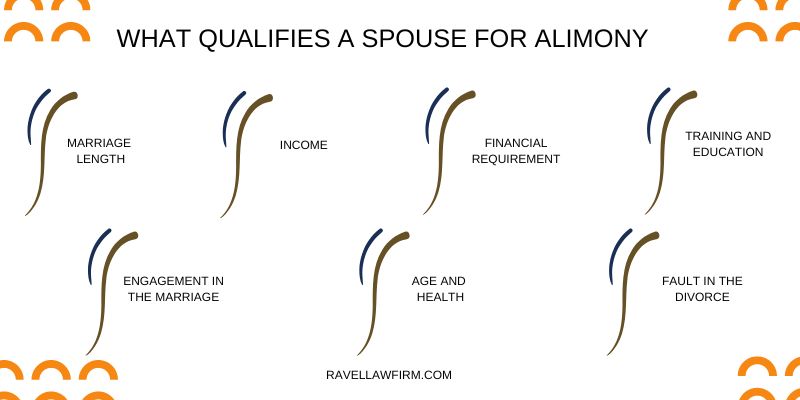Alimony, commonly known as spousal support, is a financial responsibility imposed on one spouse following a divorce. In order to preserve the quality of living that was established throughout the marriage, alimony is intended to assist the spouse who earns lower or has a reduced earning capacity.

Although the requirements for alimony vary based on the state’s legislation at the time of the divorce, the following general norms are frequently taken into account:
1. Marriage Length
In general, the lengthier the marriage, the more likely it is that alimony will be granted. This is due to the possibility that the spouse with a lower income or earning potential sacrificed employment chances in order to sustain the marriage and household.
2. Income
Both couples’ earnings and future earnings ability will be taken into account. The court may grant alimony if one spouse makes much more money than the other in order to help the other spouse maintain a similar quality of life.
3. Financial Requirement
The needs of both spouses’ finances, particularly those related to housing, health insurance, and other living expenditures, will be taken into account by the court.
4. Engagement In The Marriage
The contributions each spouse contributed to the marriage will be taken into account by the judge, including financial support for the home, childrearing, and other contributions that would have allowed the other spouse to pursue a profession.
5. Age And Health
Both partners’ ages and health will be taken into account. One spouse might require additional financial assistance if they are ill or disabled.
6. Training And Education
The court will take into account the training and education of each spouse. The court may grant alimony to assist the other spouse in pursuing additional education or training to increase their earning potential if one spouse has a higher degree of education or training that has permitted them to earn more.
7. Fault In The Divorce
For determining alimony eligibility in some states, divorce fault may be taken into account. For instance, a spouse may not be granted alimony if they committed adultery or other actions that contributed to the divorce.
Also Read: How Long Does Alimony Last?

Requirements For Alimony
The spouse requesting support must prove both their need for financial support and the other spouse’s ability to pay in order to be entitled for alimony. The length of the marriage, each spouse’s age and health, their respective incomes and earning capabilities, and the level of living throughout the marriage are only a few of the criteria the court takes into account when deciding the amount and length of alimony payments.
The spouse who is asking for alimony must also demonstrate that they contributed significantly to the marriage, whether it was monetarily or through domestic and child care responsibilities. These contributions may include caring for the home, bringing up children, and advancing the profession or education of the other spouse.
It’s crucial to remember that alimony isn’t always granted in divorce cases. In some circumstances, the court may find that the spouse who is requesting support is capable of providing for themselves or that the other spouse is unable to make payments. Additionally, as part of a premarital or postnuptial agreement, some spouses may decide to give up their claim to alimony.
In general, the court decides whether to award alimony on a case-by-case basis after taking into account a number of different criteria. Alimony is intended to help the spouse who needs it while also taking into account the other spouse’s financial status and capacity to pay.
Eligibility For Alimony
The duration of the marriage, each partner’s earnings and financial capacity, age, wellness, and support to the marriage are all taken into consideration when determining whether a spouse is eligible for alimony. In general, the spouse requesting alimony must demonstrate both their need for financial support and the other spouse’s financial capacity to pay. Yet, alimony eligibility might vary significantly based on the regulations of the particular state or nation where the divorce or separation takes place.
You May Also Like: How To Avoid Discovery In Divorce
FAQ’s
Is it hard to get alimony in Texas?
The state of Texas has tight qualifying rules and a predilection for granting rehabilitative instead of permanent alimony, so getting alimony there might be challenging.
What is not considered alimony?
Alimony does not include sums paid as part of a property settlement or child support.
Can a working wife get alimony?
A working wife who can show that she requires financial support and that her income is insufficient to cover her reasonable needs may, in some cases, be eligible to obtain alimony.

Hi, I’m Brian Gary; I have my Doctor of Juridical Science (SJD) degree from SMU Dedman School of Law in Dallas. Over the years, I have dealt with many families and successful corporate Legal cases. I have counseled many people on legal matters, and along with my profession, I write about Law on my blog. Please feel free to contact me for counseling/case discussion; I’ll be happy to help you.